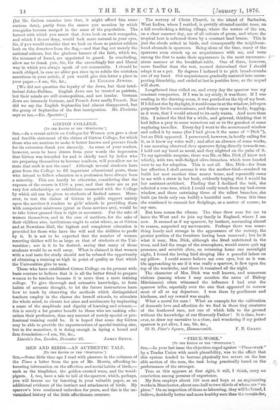MEN AND BIRDS.—AN AUTHENTIC TALE.
[TO THE EDITOR OF THE "SPECTATOR."]
SIR,—Some little time ago I read with pleasure in the columns of the Times a letter from the pen of Mr. Morris, affording in- teresting information on the affection and social habits of birds,— such as the kingfisher, the golden-crested wren, and the wood- pigeon. I, too, have a tale to tell of the sparrow, which, perhaps, you will favour me by inserting in your valuable paper, as an additional evidence of the instinct and attachment of birds. My sparrow's love continued unbroken for years, and this is the un- varnished history of the little affectionate creature. The rectory of Christ Church, in the island of Barbados,. West Indies, where I resided, is prettily situated amidst trees, on a hill overlooking a fishing village, where the waters of the sea, on a clear summer day, are of all colours of green, and where the- tropical heat is softened down by a constant land breeze. This is just the abode suited to birds, and consequently the neighbour- hood abounds in sparrows. Being alone at the time, many of the- sparrows soon struck up an acquaintance with me, and were- among the first to make their appearance in the most unceremo- '
nious manner at the breakfast-table. One of them, however, more familiar than the rest, seemed determined that I should adopt it as a pet. By degrees I induced it to pick bread-crumbs out of my hand. Our acquaintance gradually matured into unsus- pecting friendship, and ended at last in positive love, as the sequel will show.
Lengthened time rolled on, and every day the sparrow was my constant companion. If I was in my study, it was there. If I was-
reading in the drawing-room, it was perched on the tip of my boot. If I did not rise by daylight, it would come in at the window, leftopen purposely for its convenience, and flutter upon my body, begging, as it were, that I would attend to its early wants. And more than this. I missed the bird for a while, and grieved, thinking that it had fallen a prey to some voracious cat or to the gunshot of some wayfaring traveller. Every day I went to the accustomed window and called it by name (for I had given it the name of " Dick "), but no Dick appeared. I persevered, however, in loudly calling for it, as it knew my voice well ; and after an absence of some weeks, I one morning observed three sparrows flying directly towards me.
I held out my hand as usual, and they alighted on the palm of it. To my agreeable surprise, there was Mr. or Mrs. Dick (I know not which), with two well-fledged olive-branches, which were handed over to me for adoption. This is not all. Mrs. Dick—for from her affection I shall assume it was the mother-bird—resolved to- build her nest another time nearer home, and repeatedly came to me with a straw in her beak, evidently hoping that I would be her assistant-architect. Finding that I declined the task, she
selected a rose-tree, which I could easily touch from my bed-room window, and there entwining three of the tallest branches, she
built (as birds only can build) a beautiful nest. From this time she continued to commit her fledglings, as a matter of course, to my care.
But here comes the climax. The time drew near for me to leave the West and to join my family in England, where I am now. It seemed as if my sparrow, by instinct, amounting almost to reason, suspected my movements. Perhaps there was some- thing lonely and strange in the appearance of the rectory, the greater portion of the furniture having been removed ; but be it
what it may, Mrs. Dick, although she lived unfettered in the trees, and had the range of the atmosphere, would scarce quit my
presence, and mirahile dicta, on returning home one moonlight night, I found the loving bird sleeping like a peaceful infant on my pillow. I could scarce believe my own eyes, but so it was. On approaching to see if it was really a sparrow, it flew upon the top of the wardrobe, and there it remained all the night.
The character of Mrs. Dick was well known, and numerous visitors (among whom I may mention the name of Bishop
Mitchinson) often witnessed the influence I had over the- sparrow tribe, especially over the one that appeared to sorrow most of all at my departure. I won them by gentleness and kindness, and my reward was ample.
What a moral for man ! What an example for the cultivation of domestic love and affection do we find in these tiny creatures of the feathered race, not one of which falls to the ground without the knowledge of our Heavenly Father ! It is time, how- ever, to draw my narrative to a close, and wondering if my petted' sparrow is yet alive, I am, Sir, &c.,
33 St. Peter's Square, Hammersmith. F. B. GRANT.










































 Previous page
Previous page